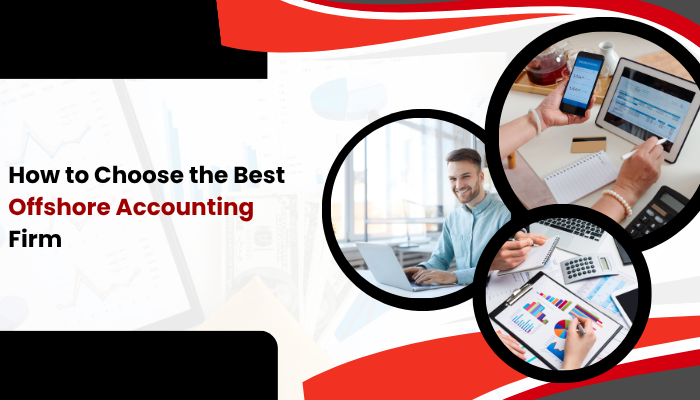If you’ve run a business in the past few years, you’ve probably heard the phrase offshore accounting more than once. Maybe it came up in a strategy meeting, or maybe your competitor mentioned saving thousands by outsourcing finance tasks. But what exactly is offshore accounting? And more importantly, how do you choose the best offshore accounting firm for your business?
Let’s face it: handling books, taxes, and payroll internally can eat up more time and resources than you’d like to admit. That’s why businesses, from startups to established enterprises, are turning to offshore accounting firms. They offer cost-efficiency, scalability, and expertise. But choosing the wrong firm? That could cost you more than money; it could hurt your brand and operations.
This article walks you through everything you need to know about offshore accounting- what it is, what to look for, red flags to avoid, and how to find a partner you can actually trust.
What Is Offshore Accounting?
Offshore accounting is the practice of outsourcing your company’s financial tasks to professionals located outside your country, typically in regions like India, the Philippines, or Eastern Europe. These firms handle everything from bookkeeping and tax preparation to financial forecasting and audit support.
Why do businesses do it? The short answer: it saves money and improves efficiency.
Instead of building a full-time accounting department, you get access to a trained team, often for a fraction of the cost. And you don’t sacrifice quality; many offshore teams are highly qualified, with certifications and experience in international finance and GAAP standards.
The Benefits of Offshore Accounting
Before we dive into how to choose a firm, it helps to know what you’re getting into. Here’s why offshore accounting is becoming a smart move for businesses of all sizes:
1. Cost Savings
Hiring in-house accountants, especially in countries like the U.S., UK, or Australia, is expensive. Salaries, benefits, office space, software licenses—it adds up fast. Offshore accounting firms can reduce your finance costs by up to 50–70%.
2. Access to Talent
Need someone familiar with international tax law or multi-currency accounting? Offshore firms often hire globally certified accountants (like CPAs, ACCAs, and CAs) who stay updated with local and international standards.
3. Scalability
Whether you’re growing fast or hitting a seasonal spike, offshore teams give you the flexibility to scale services up or down, without rehiring or retraining.
. Time Zone Advantage
While you sleep, your offshore team is working. That means quicker turnarounds and 24-hour workflows that help your business run more efficiently.
What to Look for in an Offshore Accounting Firm
Alright, now to the big question: how do you choose the best offshore accounting firm?
Here’s a checklist of what to evaluate before signing a contract.
1. Credentials and Experience
Would you trust a dentist without a license? Probably not. The same logic applies to accountants.
- Look for firms with certified accountants (CA, CPA, ACCA).
- Ask for industry-specific experience (e.g., SaaS, e-commerce, real estate).
- Request references or case studies from similar-sized businesses.
Pro Tip: Firms with experience working with U.S. or UK-based companies tend to be more familiar with local tax requirements and compliance.
2. Tech Stack Compatibility
This one’s huge. You want your offshore team to plug seamlessly into your existing systems.
- Do they work with QuickBooks, Xero, NetSuite, or whatever platform you use?
- Are they fluent in cloud-based accounting?
- Can they help you automate recurring tasks like invoicing or bank reconciliation?
If the answer is no, you might end up spending more time managing the relationship than you save.
3. Security Standards
You’re handing over sensitive financial data. Security should be a non-negotiable priority.
- Is their data stored on secure servers?
- Do they comply with global data protection laws like GDPR?
- Do they offer NDAs, encryption, and multi-level access control?
Ask tough questions about cybersecurity. A reputable offshore accounting firm will have clear answers- and proof of compliance.
4. Communication and Support
Communication gaps can tank even the most promising partnership.
- Do they assign a dedicated account manager?
- What are their response times?
- Do they work in your time zone or offer overlapping hours?
Choose a team that’s responsive, proactive, and fluent in your language (English, in most cases, for U.S. and UK-based businesses).
5. Trial Period or Pilot Project
Any firm confident in its skills will offer a pilot phase or trial period. This gives you a no-risk chance to evaluate their workflow, accuracy, and communication.
Start small. Assign a few tasks like:
- Monthly bank reconciliations
- Basic financial reporting
- Tax prep assistance
After 30 or 60 days, assess the results and decide whether to expand the relationship.
Real-Life Example: Scaling Smart
A U.S.-based SaaS company with 10 employees needed accounting support but couldn’t justify hiring a full-time CFO. They hired an offshore firm in India on a trial basis.
Within two months:
- The offshore team automated invoicing and expense tracking.
- Monthly financial reports were delivered on time.
- They saved over $4,000/month in overhead costs.
Six months in, the offshore team was managing payroll, forecasting, and preparing documents for funding rounds.
That’s the power of choosing the right offshore accounting partner.
Red Flags to Avoid
Let’s be honest—not all offshore accounting firms are equal. Here are a few red flags to keep an eye out for:
- No clear pricing or vague billing terms
- Overpromising on services they can’t realistically deliver
- Poor English communication or inconsistent availability
- Lack of transparency with work processes
- No industry experience or credentials
When in doubt, trust your gut and ask for more details. A quality firm will welcome questions.
Where Should You Offshore?
Many businesses look to offshore accounting to India, and for good reason:
- Large pool of English-speaking, highly qualified professionals
- Familiarity with U.S. and UK accounting standards
- Competitive pricing
- Strong data security and process maturity in top firms
India continues to be a leader in offshore finance services, offering the right mix of affordability and expertise.
Final Thoughts
It’s easy to chase the cheapest quote when looking for an offshore accounting firm. But remember, this is your financial backbone. You want a partner, not just a vendor.
A good offshore accounting partner will help you:
- Stay compliant
- Make smarter decisions
- Focus on growth, not paperwork
So take your time. Do your research. Start small if you need to.
And if you’re considering offshore accounting to India, you’ll find a wide range of reliable firms with the tools, talent, and tech to help your business thrive in 2025 and beyond.
Click – todayigosolar.com


